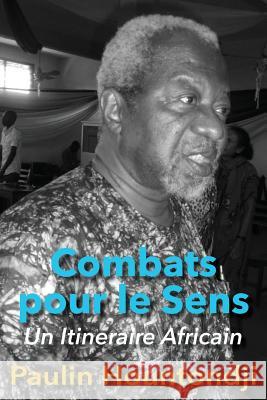Combats pour le Sens: Un Itineraire Africain » książka
Combats pour le Sens: Un Itineraire Africain
ISBN-13: 9789956728176 / Francuski / Miękka / 2013 / 284 str.
Published here in French by Cameroon based Langaa RPCIG, 'The Struggle for Meaning' is a landmark publication by one of African philosophy's leading figures, Paulin J. Hountondji, best known for his critique of ethno-philosophy in the late 1960s and early 1970s. In this volume, he responds with autobiographical and philosophical reflection to the dialogue and controversy he has provoked. He discusses the ideas, rooted in the work of such thinkers as Husserl and Hountondji's former teachers Derrida, Althusser, and Ricoeur, that helped shape his critique. Applying his philosophical ideas to the critical issues of democracy, culture, and development in Africa today, he addresses three crucial topics: the nexus between scientific extraversion and economic dependence; the nature of endogenous traditions of thought and their relationship with modern science; and the implications - for political pluralism and democracy - of the emergence of 'philosophies of subject' in Africa. While the book's immediate concern is with Africa, the densely theoretical nature of its analyses, and its bearing on current postmodern theories of the iother, i will make this timely and elegant translation of great interest to many disciplines, especially ethnic, gender, and multicultural studies.
Published here in French by Cameroon based Langaa RPCIG, The Struggle for Meaning is a landmark publication by one of African philosophys leading figures, Paulin J. Hountondji, best known for his critique of ethno-philosophy in the late 1960s and early 1970s. In this volume, he responds with autobiographical and philosophical reflection to the dialogue and controversy he has provoked. He discusses the ideas, rooted in the work of such thinkers as Husserl and Hountondjis former teachers Derrida, Althusser, and Ricoeur, that helped shape his critique. Applying his philosophical ideas to the critical issues of democracy, culture, and development in Africa today, he addresses three crucial topics: the nexus between scientific extraversion and economic dependence; the nature of endogenous traditions of thought and their relationship with modern science; and the implications - for political pluralism and democracy - of the emergence of philosophies of subject in Africa. While the books immediate concern is with Africa, the densely theoretical nature of its analyses, and its bearing on current postmodern theories of the ìother,î will make this timely and elegant translation of great interest to many disciplines, especially ethnic, gender, and multicultural studies.











